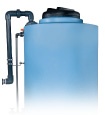Sodium hydroxide (NaOH), also known as caustic soda or lye, is a common inorganic compound that is typically used as a strong chemical base. Sodium hydroxide is used to manufacture soaps, rayon, paper, explosives, dyestuffs, and petroleum products. It is also used in processing cotton fabric, laundering and bleaching, metal cleaning and processing, oxide coating, electroplating, and electrolytic extracting.
Topics:
Tank Design and Materials,
Chemical Storage
Peracetic acid is a bactericide and fungicide that is used in the food industry and water treatment industry. It’s a potent chemical that must be treated with care and stored properly. Improper handling could be costly and result in personal injury.
Topics:
Chemicals,
Chemical Storage
Liquid ammonium sulfate (LAS) started as a liquid fertilizer that was applied to hard ground. Today, LAS has become widely accepted as a stable and effective source of ammonia for chlorination in water treatment. Alternatives such as anhydrous or aqueous ammonia are hazardous, sometimes requiring pressurized storage tanks and special handling and safety procedures.
Topics:
Chemicals,
Chemical Storage
While many of the chemicals stored in polyethylene tanks don’t require side manways, these accessories are available as an add-on option to Poly Processing chemical storage tanks. A side manway often provides several safety and efficiency benefits that may be worth considering for your facility.
Topics:
Chemical Storage
Hydrochloric acid (HCl), also known as muriatic acid, is toxic and highly corrosive. The chemical is used in many different applications, including chloride production, refining ore, and producing metals like tantalum and tin.
Topics:
Chemical Storage
Winter is approaching fast. With below freezing temperatures and snowstorms affecting millions of people each year, municipalities need to be ready to clear roadways and maintain equipment. De-icing fluid is used to break down ice and frost on roadway surfaces and aircraft. The substance used for de-icing depends on its application, the amount of snowfall, the municipality’s preferences, and winter temperatures. A variety of chemicals are used in the de-icing process, including brine, magnesium chloride, propylene glycol, and ethylene glycol. Brine is the most popular of these chemicals, but it can damage vehicles or rebar on roadways.
Topics:
Applications,
Chemical Storage
Sulfuric acid can be a tricky chemical to store. Used in a wide variety of industrial applications, sulfuric acid is heavy, can create toxic or flammable gas, and can burn the skin. A smart storage solution for sulfuric acid should start with a well-thought-out tank design — not just the tank material but the entire storage system and all its components. Thinking through the entire sulfuric acid tank system design up front will help you protect your employees, the environment, and your investment. Read on for our recommendations on the right material, configuration, and standards for safe sulfuric acid storage.
Topics:
Chemicals,
Chemical Storage
Poly Processing tanks are used for water and wastewater treatment applications, but are also found in dozens of industries nationwide. We’re able to work with a wide variety of businesses and organizations that use chemicals to produce goods and products. This is the first in a series of articles over the next several months that will feature a selection of the markets we serve. (View the full list of the markets we serve.)
Topics:
Applications,
Tank Design and Materials,
Chemical Storage
Municipal projects require detailed specifications for anything purchased as a capital expense. At Poly Processing Company, we’ve teamed up with national engineering firms and municipalities to develop industry leading pre-written engineering specifications for our three most popular polyethylene chemical tanks: the SAFE-Tank®, the vertical tank with IMFO® and the upright vertical storage tank.
Topics:
Certifications and Standards,
Value Added,
Chemical Storage
If you aren’t increasing your chemical storage capacity, it might be time to reevaluate your storage strategy. Over the last couple of years, many Poly Processing customers have shifted their approach to storing chemicals. They are increasing their total volume capacity in response to many of the market’s trends. External factors, such as the war in Ukraine and supply chain issues, have a trickle-down effect that impacts companies that need to buy and store chemicals. These companies are discovering that it makes good business sense to upsize their chemical storage capacity — both from an operational perspective and a financial one. Should your facility increase your chemical storage capacity? Here are some compelling reasons it might make sense for you to upsize.
Topics:
Chemical Storage



